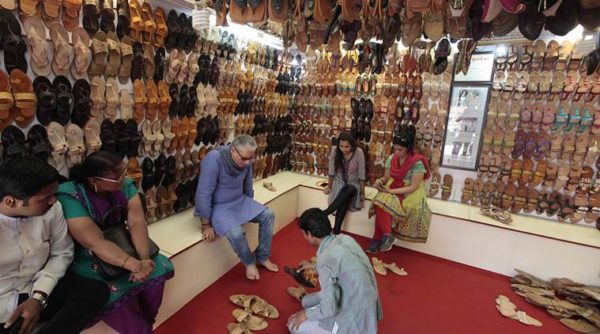Kolhapur may have lent its name to the famous chappal, but the industry has taken a hit with the rise of cow vigilantes.
In a small room in Chappal Gali in Kolhapur, five men are seated on the floor, stitching and designing the traditional handcrafted slippers that are named after the town they are manufactured in. One of them fixes the strap on the slipper, another draws the pattern of the sole on a thick buffalo hide, while a third sticks the two layers of the sole together. Rajendra Namdeo Kadam’s unit is one of the 50-odd shops that is still in business in the famous Chappal Gali but is battling a crisis made worse after tanneries have closed down following threats by cow vigilantes.
Even before the vigilantes arrived, the industry was already in the red. Over the last few years, the Maharashtra Pollution Control Board (MPCB) has shut down many units for violating green norms. The remaining shut shop after suppliers stopped sending them hides once the ban on slaughter of cow, bulls, calves and oxen came into effect in Maharashtra in March 2015.
Though the ban shouldn’t have affected the manufacture of Kolhapuri slippers given that they use leather that comes from the buffalo hide, such was the fear following threats by gau rakshaks, that the suppliers stopped sending hide altogether. Kolhapur, which once had 46 tanning units, has none now and the makers of Kolhapuri chappals, once a must-have in every college student’s closet, have now turned to suppliers outside the state, jacking up the price of the slipper by almost 20 per cent.
Kadam ran a tanning unit too but was forced to shut it after the ban on slaughter. “The skin of animals like the buffalo and goat can be used after they die and we used it to make Kolhapuris. But ever since the beef ban has come into effect, nobody is ready to touch the carcass of any animal. We were asked to shut the units on the charges of ‘pollution’, despite the fact that unlike some of the tanning units of Karnataka which use chemicals for processing, all the material we used in the bag tanning process are natural and wasn’t harmful for the environment,” said Kadam. After his tanning unit shut, Kadam started sourcing raw material from Nipani in Karnataka, a town that is half-an-hour away from Kolhapur.



Leave a reply